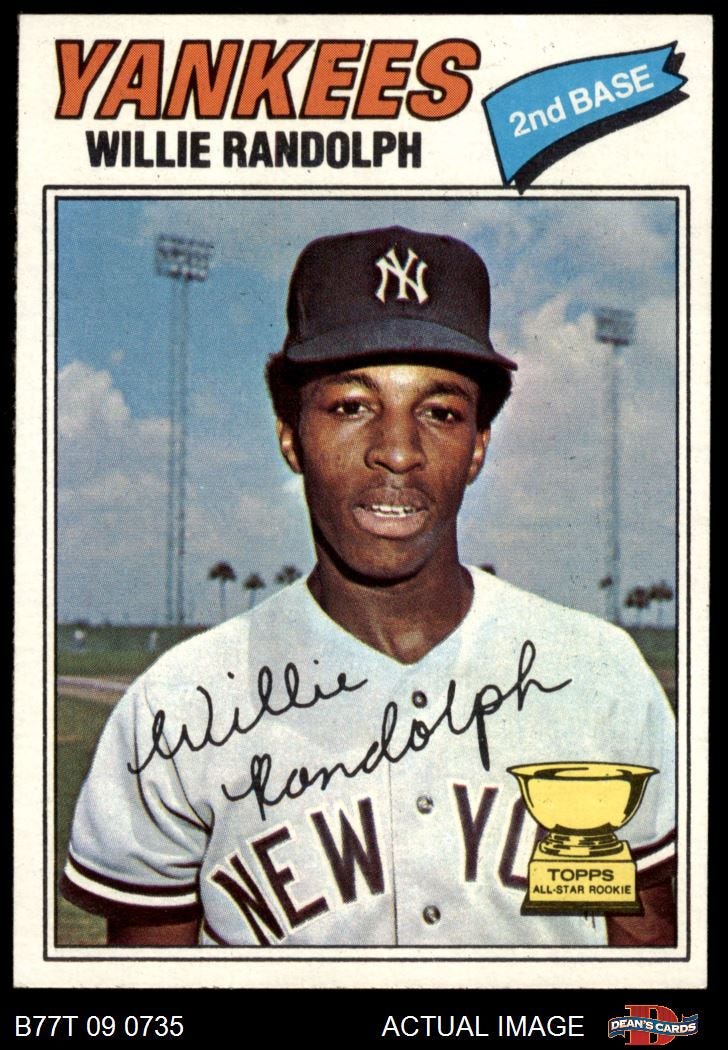Willie Randolph was one of my MLB heroes. Growing up in Northern New Jersey, and a Yankees fan, his emergence as the Yankees second baseman was well-timed with my adolescene. And while the Yanks of the late 1970s had plenty of fireworks, Willie just went out every day and did his job. No fanfare. It is no wonder his career extended well after he was done playing, as a coach and manager.
So when Classic Baseball World writer Julien Price told me he was going to write his latest “Tough Outs” article on Willie Randolph, a smile came to my face. Same for any Classic Era fan who remembers this leader by example. Enjoy this latest article! - RI
Willie Randolph was born on July 6, 1954, in Holly Hill, South Carolina. He relocated with his family to Brooklyn, New York, where he grew up in the Brownsville district, which was noted for its economic hardships and high crime rates. In this environment, baseball became his haven. Randolph spent numerous hours on the sandlot, honing his talents and developing the discipline that would characterize his career.
Randolph quickly rose to prominence at Samuel J. Tilden High School. His coach, Herb Abramowitz, recalls his work ethic, which included staying late to take additional ground balls and practicing diving for plays on the gym mat. Despite his talent, he was missed by many scouts owing to his diminutive frame and lack of strength. However, the Pittsburgh Pirates recognized potential and took him in the seventh round of the 1972 MLB Draft.
The journey to the majors was not simple. The Pirates' infield was loaded with All-Stars, making it difficult for Randolph to break through. Despite dominating in the lower levels, he saw little opportunities to advance with Pittsburgh. His career changed dramatically in December 1975, when he was traded to the New York Yankees, a move that received little attention at the time.
With the Yankees, Randolph took advantage of his opportunity. In 1976, at the age of 21, he gained the starting position at second base. That season, he received his first All-Star selection and helped the Yankees win their first World Series in 12 years. Despite their loss to the Cincinnati Reds, Randolph had shown himself as a critical player.
Randolph was never the biggest personality in the Yankees' locker room, but his leadership was crucial. His ability to get on base (.373 career OBP) and consistent defensive play made him a key component of the team's success. He contributed significantly to the Yankees' back-to-back World Series victories in 1977 and 1978, giving stability on a roster that included larger-than-life players such as Reggie Jackson and Thurman Munson.
Randolph's 18-year playing career included 2,210 hits, six All-Star appearances, and a Silver Slugger Award in 1980. More than his statistics, his manner made him irreplaceable. He was the type of player that managers relied on to keep a team together, and teammates looked to him for leadership. Former Yankees pitcher Ron Guidry once said "Willie was like a second coach on the field."
From second coach to big league skipper
Randolph's contributions to the game did not cease with his retirement as a player. He moved effortlessly into coaching, spending 11 seasons as an important member of the Yankees' staff. He was instrumental in nurturing young players such as Derek Jeter, Bernie Williams, and Mariano Rivera, coaching them in the same way he taught teammates on the field.
He made history in 2005 by becoming the New York Mets' first African American manager. In only his second season, he led the team to 97 wins and the NL East title, narrowly missing out on the World Series by one game. Though his career with the Mets ended in 2008, he continued to coach for clubs such as the Milwaukee Brewers and Baltimore Orioles.
Besides coaching, Randolph stayed deeply interested in community activities. He has advocated for youth baseball programs, particularly in impoverished neighborhoods, to ensure that young athletes have the opportunity to pursue their aspirations. Through efforts such as the Willie Randolph Foundation, he has funded scholarship programs and mentorship for student athletes.
Willie Randolph's story is about perseverance and leadership. While his name isn't typically first mentioned among Yankees icons, his impact is unmistakable. He demonstrated that success is more than simply talent; it's also about discipline, resilience, and the capacity to inspire others.
His impact on the game is seen today via the players he coached, the young athletes he taught, and the professional legacy he left behind. In a sport that frequently praises its biggest stars, Randolph demonstrated that the most respected leaders are sometimes the quietest.


